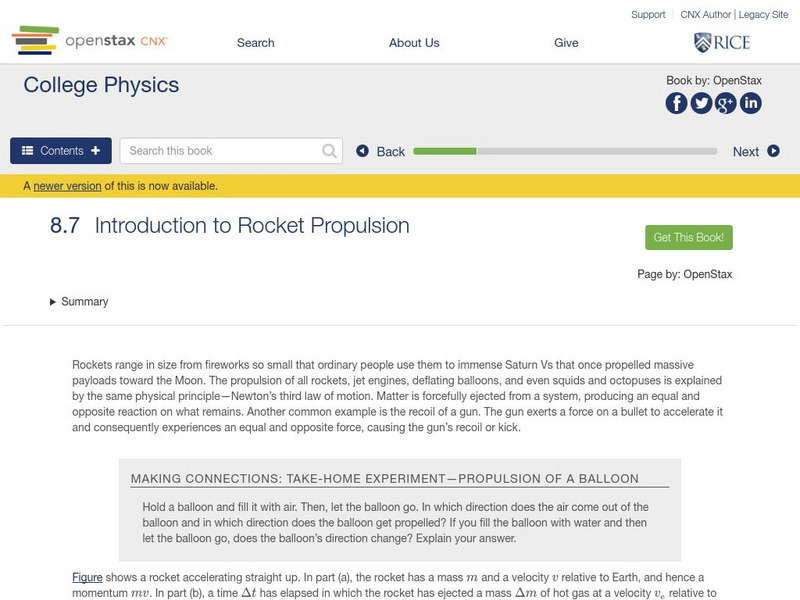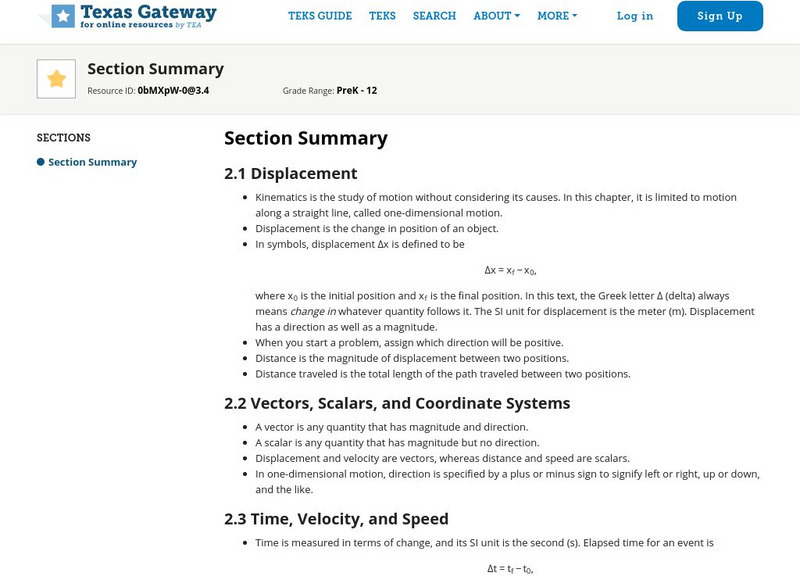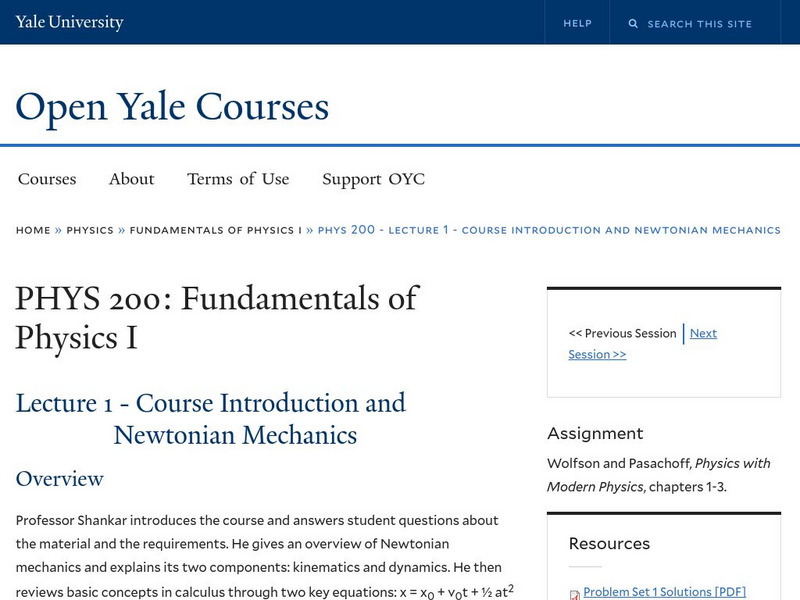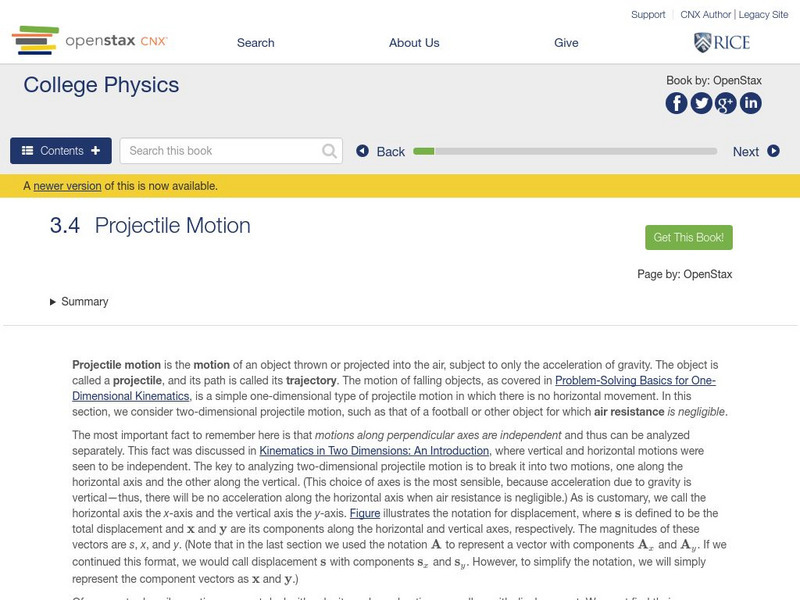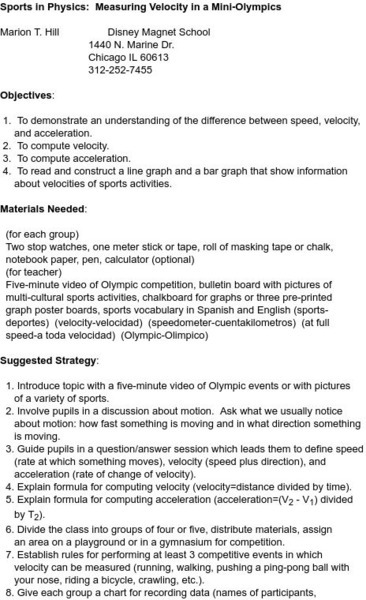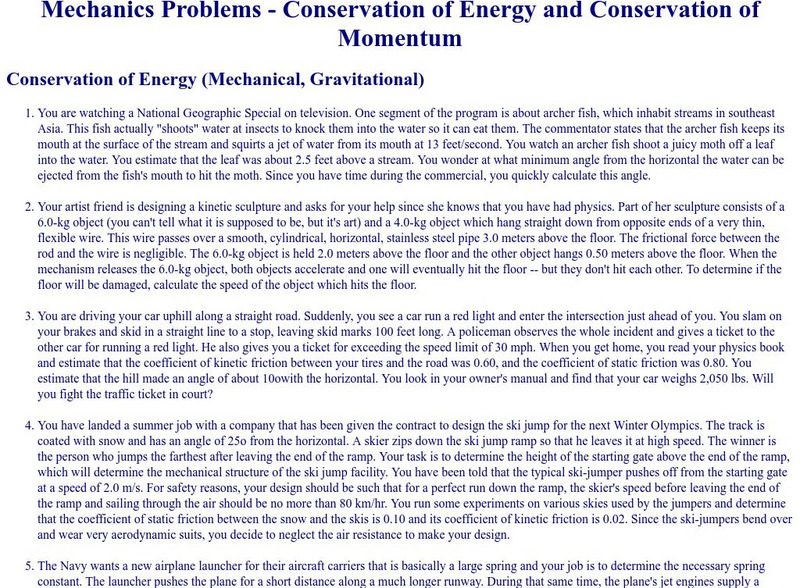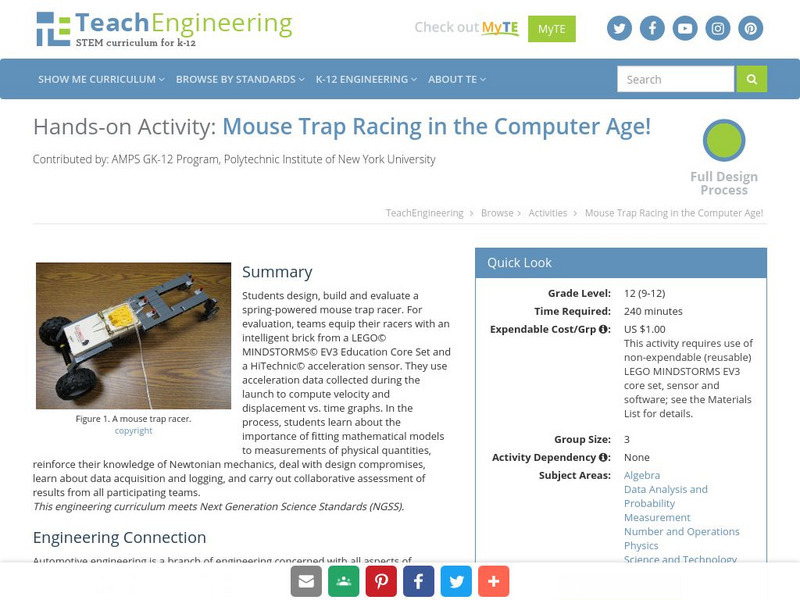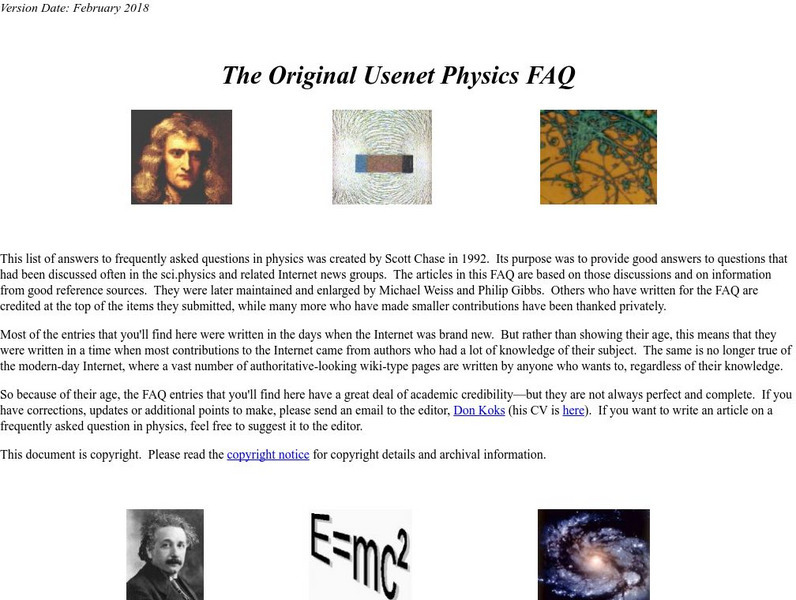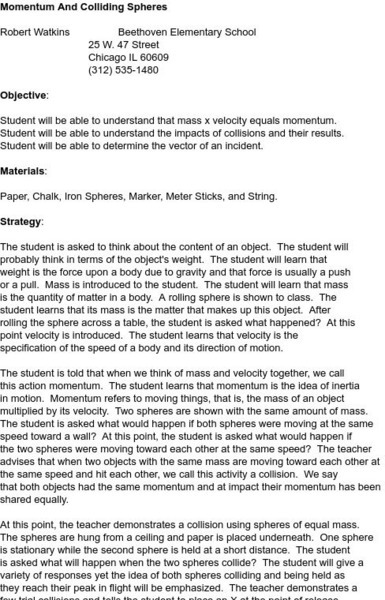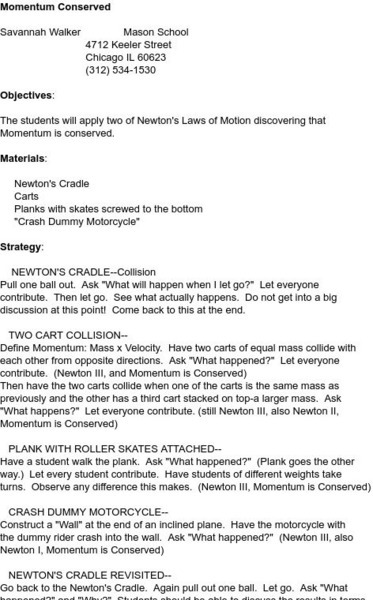OpenStax
Open Stax: Introduction to Rocket Propulsion
From a chapter on Linear Momentum and Collisions in a Physics textbook. This section of the chapter discusses Newton's third law of motion in the context of rocket and jet engine propulsion. Students learn how to calculate a rocket's...
Texas Education Agency
Texas Gateway: Kinematics Section Summary
This is a summary of the main topics for AP Physics Chapter 2 Kinematics. These include Displacement; Vectors, Scalars, and Coordinate Systems; Time, Velocity, and Speed; Acceleration; Motion Equations for Constant Acceleration in One...
Texas Instruments
Texas Instruments: Classroom Activities: Parachuting
This activity explores a parachutist and her position, velocity and acceleration. Graphing and calculating these functions will be required.
Yale University
Open Yale Courses: Physics 200: Fundamentals of Physics
The first of a whole series of lectures given by Professor Shankar of Yale. This first lecture is an overview of Newtonian mechanics. The lecture comes in video or audio format. A transcript is also available.
Khan Academy
Khan Academy: What Are the Kinematic Formulas?
Featured are the kinematic formulas or main equations you can use to analyze situations with constant acceleration.
OpenStax
Open Stax: Projectile Motion
The following interactive helps students understan how to identify and xplain the properties of a projectile, such as acceleration due to gravity, range, maximum height, and trajectory. They will determine the location and velocity of a...
Physics Classroom
The Physics Classroom: 1 Dimensional Kinematics
An activity in which average speed is calculated for a ball sliding along an inclined plane. This speed is compared to various instantaneous speeds along the incline.
Science and Mathematics Initiative for Learning Enhancement (SMILE)
Smile: Sports in Physics: Measuring Velocity in a Mini Olympic
The Illinois Institute of Technology provides this site on Physics. It is a student lab investigation in which students compare the concept and quantity of velocity to that of acceleration. Includes directions, ideas for assessment, a...
Soft Schools
Soft Schools: Physics Quizzes: Newton's Three Laws
Assess your understanding of Newton's three laws of motion and the ability to distinguish between the three with this interactive multiple choice quiz. Receive immediate feedback to your answers.
University of Minnesota
University of Minnesota: Conservation of Momentum
This site provides a set of four Physics problems dealing with the conservation of momentum principle.
Texas Education Agency
Texas Gateway: Kinematics in Two Dimensions: Projectile Motion
By the end of this section, you will be able to identify and explain the properties of a projectile, such as acceleration due to gravity, range, maximum height, and trajectory; determine the location and velocity of a projectile at...
Khan Academy
Khan Academy: Start: How Do Computers Simulate the Motion of Virtual Particles?
In this lesson we'll explore how we use fairly simple physics to draw particles which move according to the forces we feel in the real world (such as wind & gravity).
Physics Classroom
The Physics Classroom: Electric Current
This tutorial introduces the concept of electric currents. Take the interactive quiz to assess your understanding.
TeachEngineering
Teach Engineering: Mouse Trap Racing in the Computer Age!
Students design, build and evaluate a spring-powered mouse trap racer. For evaluation, teams equip their racers with an intelligent brick from a LEGO MINDSTORMS NXT Education Base Set and a HiTechnic acceleration sensor. They use...
TeachEngineering
Teach Engineering: Projectile Motion
Students are introduced to the concept of projectile motion, of which they are often familiar from life experiences,such as playing sports such as basketball or baseball, even though they may not understand the physics involved. Students...
Other
Uc Riverside: Usenet Relativity Faq
A physics usenet listing of frequently asked questions relating to relativity, answered by a number of scientists. Administrivia and Reference, Speed of Light, Special Relativity, General Relativity and Cosmology, Black Holes. Loads of...
Wikimedia
Wikipedia: The Black Hole
This site examines the black hole as an object in astrophysics. Delve into this comprehensive resource that covers this concept from its history, to qualitative physics, the reality of black holes, mathematical physics and more.
Curated OER
Zona Land: Components of a Vector
An interactive Java applet where users can rotate a vector about its tail and view the components of that vector. Magnitude of the components is updated on screen as the vector is dragged.
Texas Education Agency
Texas Gateway: Rotational Motion and Angular Momentum: Glossary
This is the glossary of terms and definitions used in Chapter 10: Rotational Motion and Angular Momentum from the AP Physics online text.
Other
Center for Education Partnerships: The Marble Roll
In this Science-athon, students try to make their marble roll the farthest across a flat surface, using their knowledge of forces, motion, and energy to guide them through their apparatus design. Teachers must enroll online.
Science and Mathematics Initiative for Learning Enhancement (SMILE)
Smile: Colliding Spheres
This lab activity from the Illinois Institute of Technology lets students investigate the impact of collisions upon the velocity and momentum of the colliding objects. Requires understanding of vectors.
Science and Mathematics Initiative for Learning Enhancement (SMILE)
Smile: Momentum Conserved
This site by the Illinois Institute of Technology gives a Lab activity in which young scholars use a variety of toys to discover Newton's second law and momentum conservation. Newton's cradle, skate boards, and a toy motorcycle are...
ClassFlow
Class Flow: Fitting Models to Data
[Free Registration/Login Required] A basic premise of science is that much of the physical world can be described mathematically and many physical phenomena are predictable. This scientific outlook took place in Europe during the late...
Khan Academy
Khan Academy: What Are Position vs. Time Graphs?
What can you learn from graphs that relate position and time and how are they useful? Article relates what the verticle axis, slope, and curvature represents on a position graph and provides examples.


